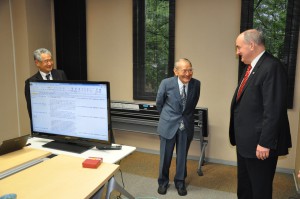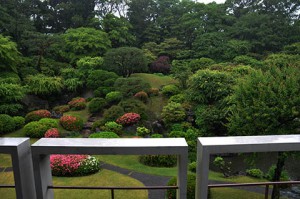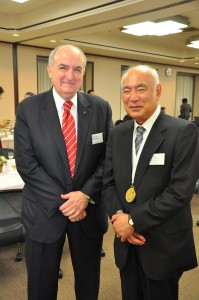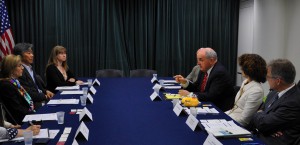Reflecting on growth and rejuvenation in Japan
The steady morning drizzle that fell on members of the IU delegation during the last day of this four-day trip to Japan seemed especially fitting, considering how the themes of growth and rejuvenation were reflected in nearly all of the discussions and activities that took place here.
Indeed, as the delegation prepares to embark on the next leg (Beijing) of this two-week presidential trip, there’s a strong sense that the seeds planted Monday and Wednesday in Tokyo and Tuesday in Osaka will generate a renewed rise in the number of IU students studying abroad here in Japan and, likewise, more Japanese students coming to IU for their own international experience.
Despite the current trend of declining student exchanges between the U.S. and Japan, it’s clear that the ground here in Japan is fertile for future ideas, innovation and collaboration. And though universities like IU, Waseda University and Osaka University will be looked upon to reverse recent years’ developments and drive greater globalization of students, they won’t be without able and willing help.
The lush, floral garden outside Tokyo’s International House of Japan, which IU delegation members visited Wednesday morning, served to symbolize the supportive environment that exists in Japan for future growth. An independent, not-for-profit, non-governmental organization, the International House has, for more than a half century, promoted a broader international outlook in Japan through an emphasis on cultural exchange and global education. Though not a college or university, it operates, according to chairman Akashi Yasushi, almost like an international academy, serving as an inspiring meeting place for intellectuals from around the world, including those who toil in academia, the arts, international relations and business, among other fields.
Upon leaving the International House, members of the IU delegation then met with Masahide Shibusawa, president and CEO of the Shibusawa Eiichi Memorial Foundation, a private foundation started by protégés of his great-grandfather, Shibusawa Eiichi, more than 120 years ago. If anyone symbolized the possibilities of greater internationalization through education and cultural exchange, it was Shibusawa Eiichi (1840-1931), a leading figure in the development of modern Japanese society.

From left to right: Jun’etsu Komatsu, managing director of the Shibusawa Eiichi Memorial Foundation, Foundation President Masahide Shibusawa and IU President Michael A. McRobbie.
Out of small, rural farming roots, Shibusawa grew to become a dynamic force in the industrial world, brashly rubbing elbows with the Rockefellers and Edisons, according to Masahide, and helping to establish a whopping 500 enterprises and economic organizations in Japan, such as the Tokyo Chamber of Commerce. He also founded another 600 organizations dedicated to social welfare, education and international exchange, made possible by way of his private-sector diplomacy and broad circle of acquaintances across Asia and America, to whom he reached out regularly.
If Shibusawa Eiichi were alive today, you can bet he’d plant himself as often as he could at the U.S. embassy in Japan, which was where members of the IU delegation found themselves Wednesday afternoon. There, IU President Michael A. McRobbie and Caroline Kennedy, U.S. ambassador to Japan, engaged in a lively discussion about strategies and programs being developed to increase the number of Japanese and American students studying abroad in each other’s countries to reverse the declines in recent years.
“Japan can come back,” Kennedy said, “but it’s up to all of us to do more to get the fuller story out there.”
Of course, IU already has a strong story to tell with regard to its history of engagement in Japan, the number of Japanese scholars and visitors the university has welcomed to Indiana over the years and the number of Hoosier students, faculty and staff who have grown close ties here. More than 100 Japanese students studied at IU last year, and Japan today has more than 1,500 living IU alumni.
About 100 of those alumni, including several who studied at IU as long ago as the 1950s, came to Tokyo on Wednesday night to celebrate the 50th anniversary of IU’s alumni chapter in Japan, which was created by Fujitsu co-founder Kaoru Ando. The gathering – the largest ever held in the chapter’s history – was a festive affair, full of many fond memories of time spent at IU and eager interest in the future of the university. It also featured a special presentation, as McRobbie presented one of Japan’s musical treasures, renowned cellist Tsuyoshi Tsutsumi, with IU’s Thomas Hart Benton Medallion, one of the university’s highest honors.
For those who don’t know, Tsutsumi arrived at IU in his late teens to study at the Jacobs School of Music with the legendary cellist Janos Starker on a Fulbright Scholarship, after studying at the Tokyo Conservatory under Hideo Saito and after a concert tour of India and Europe. Within a couple of years, he became Starker’s assistant and earned an artist’s diploma from the Jacobs School in 1965.
After a successful concert career with many of the world’s leading orchestras, he returned to IU Bloomington and the Jacobs School, where he taught from 1988 to 2006.
He received the National Academy of Arts Prize in music from the Emperor of Japan and, in 2009, the government of Japan awarded him a Medal of Honor with purple ribbon for his contributions to academic and artistic developments, improvements and accomplishments.
Tsutsumi’s receipt from McRobbie of the Hart Benton Medallion, and the riveting cello concert he gave immediately afterward, proved to be a fitting coda to the IU delegation’s visit to Japan and further inspiration for great collaboration and growth here in the months and years ahead.
Tags: Akashi Yasushi, Caroline Kennedy, Indiana University, International House of Japan, IU, IU Japan Alumni Chapter, Jacobs School of Music, Japan, Osaka, Osaka University, Shibusawa Eiichi, Shibusawa Eiichi Memorial Foundation, Thomas Hart Benton Medallion, Tokyo, Tsuyoshi Tsutsumi, Waseda University
 Indiana University
Indiana University




